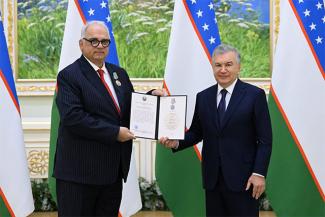Sadulaev Tops Rival Snyder in 3rd Clash for Tokyo Olympics Gold
Saturday, August 7, 2021 - 12:22 By Ken Marantz

CHIBA, Japan (August 7)---Abdulrashid SADULAEV (ROC) came out on top in his latest clash with fellow Rio Olympic champion Kyle SNYDER (USA) at freestyle 97kg, winning "Snyderlaev III" 6-3 on Saturday night.
In the highly anticipated battle at Makuhari Messe Hall A, reigning world champi0n Sadulaev scored twice on tilts in countering low singles by Snyder and held on to add a second Olympic gold to his four world titles.
"Unbelievable, awesome," Sadulaev said. "I know this feeling because five years ago I won. It’s more difficult to defend than to win. So it’s a dream today."
Sadulaev took a 2-0 lead in the second period after receiving an activity point and scoring on a stepout.
In the second period, Snyder shot for a low single and Sadulaev showed how he earned his nickame "The Russian Tank" when he lifted the American off the mat. While Sadulaev wasn't able throw Snyder for points, he managed to tilt him over.
A short time later, Snyder got in on the same single leg, and the result was exactly the same, giving the Russian a 4-0 lead.
Snyder, a two-time former world champion, put himself back into the match with a hard-earned takedown with 50 seconds left, then added a stepout point with :28 on the clock. But the 25-year-old Sadulaev wasn't budging after that, and held on for his second win in two career matches with Snyder.
Asked about how he felt about his historic victory, Sadualev said, "To be honest for now I don’t eel anything because I am too tired. Maybe after sometime I will tell you."
The two, born just six months apart, had been on parallel tracks throughout their careers, both winning senior world freestyle titles in 2015 and an Olympic gold at Rio 2016, all before their 21st birthdays.
Sadulaev won the 86kg gold in Rio, where Snyder triumphed at 97kg. Sadulaev moved up to 97kg the next year, and their paths first crossed in the final at the 2017 World Championships in Paris in a match immediately dubbed "The Match of the Century."
Snyder prevailed to take the gold, which also gave the U.S. the freestyle team title, scoring the winning points of a 6-5 decision in the final 30 seconds. A year later in Budapest, Sadulaev turned the tide turned in the world with an innovative fall in just 70 seconds.
At the 2019 World Championships, a highly anticipated third match never came about after Snyder lost in the semifinals to 2012 London Olympic champion Sharif SHARIFOV (AZE) as Sadulaev went on to win his fourth world title.


Share your thoughts.
Comments